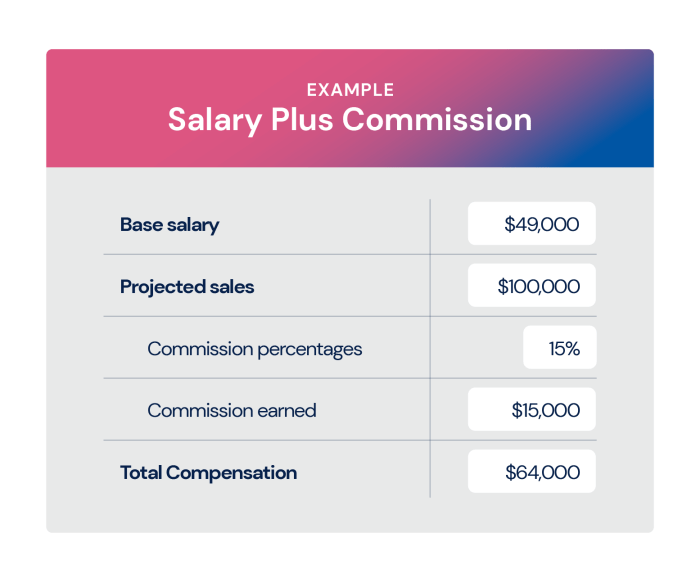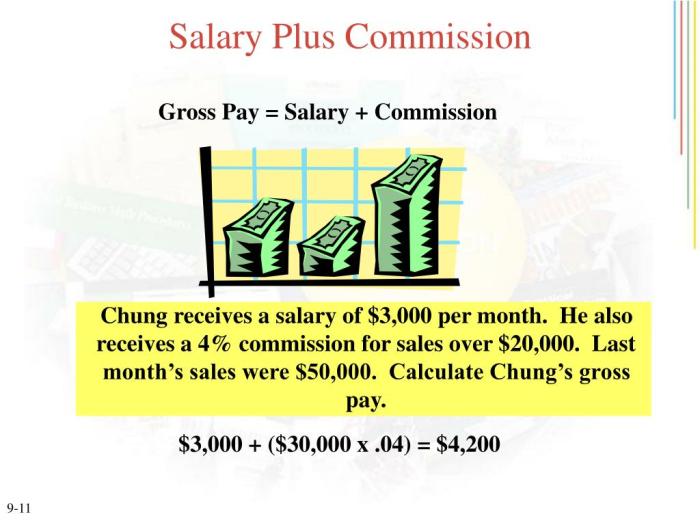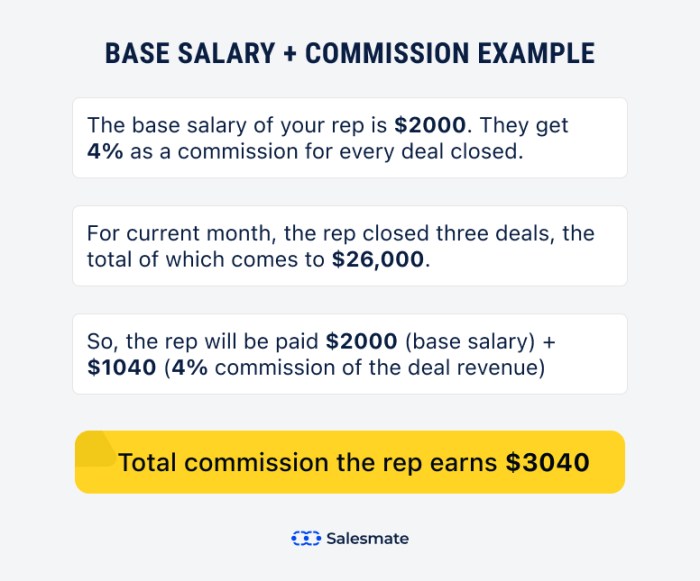Tamara earns her living as a salary plus commission employee, a compensation structure that combines a fixed salary with variable earnings based on performance. This unique pay model presents both opportunities and challenges, offering insights into the intricacies of employee motivation, performance management, and career growth.
The following discussion delves into the intricacies of salary plus commission compensation, examining its prevalence across industries, the factors influencing commission earnings, and the strategies for maximizing income potential. Additionally, we explore the performance metrics used to evaluate employees, the tax implications of this compensation structure, and the career development opportunities available within salary plus commission roles.
Income Structure of Salary Plus Commission Employees: Tamara Earns Her Living As A Salary Plus Commission Employee

Salary plus commission compensation is a pay structure that combines a fixed salary with a variable commission component based on performance. This structure is common in sales, real estate, and other industries where employees have the potential to generate significant revenue for the company.
The advantage of salary plus commission pay is that it provides employees with a guaranteed base income while also offering the opportunity to earn additional income based on their performance. This can motivate employees to work harder and generate more sales, which can benefit both the employee and the company.
However, there are also some disadvantages to salary plus commission pay. One disadvantage is that employees may experience fluctuations in their income, as their commission earnings can vary depending on their sales performance. Additionally, employees may feel pressure to meet or exceed sales targets, which can lead to stress and burnout.
Factors Influencing Commission Earnings
The key factors that determine commission earnings include:
- Sales volume: The higher the sales volume, the higher the commission earnings.
- Product mix: The commission rate may vary depending on the product or service being sold.
- Customer relationships: Building strong relationships with customers can lead to repeat business and higher commission earnings.
To maximize commission earnings, employees should focus on increasing their sales volume, selling high-margin products or services, and building strong relationships with their customers.
Performance Management and Evaluation, Tamara earns her living as a salary plus commission employee
Performance metrics used to evaluate salary plus commission employees include:
- Sales volume
- Commission earnings
- Customer satisfaction
It is important to set clear performance goals and expectations for salary plus commission employees. This will help to ensure that they are working towards the same objectives as the company. Regular performance reviews should be conducted to provide feedback and identify areas for improvement.
Tax Implications
Salary plus commission income is subject to both income tax and self-employment tax. Earned income is taxed at a lower rate than self-employment income, so it is important to understand the difference between the two. Employees should consult with a tax professional to ensure that they are meeting their tax obligations.
Career Development
Salary plus commission roles can provide opportunities for career growth and advancement. Employees who consistently exceed sales targets and build strong customer relationships may be promoted to management positions or other roles with higher responsibilities.
To build a strong career path, employees should focus on developing their sales skills, product knowledge, and customer relationship management skills. They should also seek out opportunities for training and development.
Key Questions Answered
What are the advantages of salary plus commission compensation?
Salary plus commission compensation offers the potential for higher earnings compared to fixed salary structures, as employees are rewarded for their performance and sales success. It also aligns employee incentives with company goals, motivating them to drive sales and contribute to the organization’s growth.
What are the disadvantages of salary plus commission compensation?
Salary plus commission compensation can lead to income fluctuations, as earnings are tied to sales performance. This can create financial uncertainty for employees, especially during periods of low sales or economic downturns. Additionally, the pressure to meet sales targets can lead to burnout and decreased job satisfaction.
How can employees maximize their commission earnings?
To maximize commission earnings, employees should focus on building strong customer relationships, understanding product offerings, and developing effective sales strategies. They should also track their sales performance regularly, identify areas for improvement, and seek opportunities for professional development.


